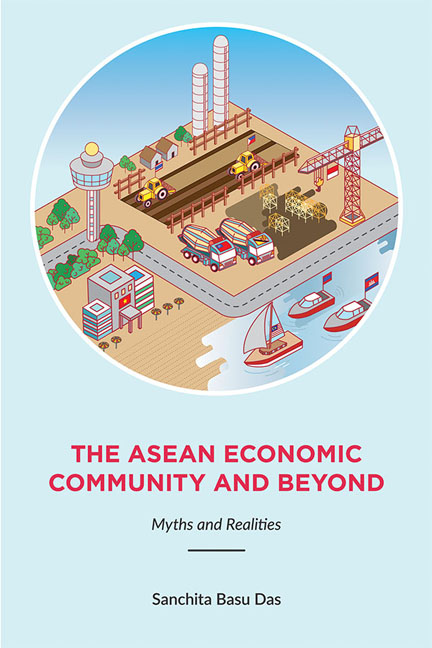Book contents
- Frontmatter
- Dedication
- Contents
- Foreword
- Acknowledgements
- Abbreviations
- 1 Introduction: The ASEAN Economic Community and Beyond
- I THE ASEAN ECONOMIC COMMUNITY (AEC)
- 2 The ASEAN Economic Community: An Economic and Strategic Project
- 3 Can the ASEAN Economic Community Be Achieved by 2015?
- 4 Goods to Flow Slow and Steady within the ASEAN Economic Community
- 5 The Limited Impact of the ASEAN Economic Community on Skilled Labour Migration
- 6 Five Facts About the ASEAN Economic Community
- 7 Growing Economic Diplomacy in ASEAN: Opportunities and Threats
- 8 Towards ASEAN Economic Community 2025!
- II BEYOND THE ASEAN ECONOMIC COMMUNITY
- III AN ASEAN PERSPECTIVE OF REGIONAL CONNECTIVITY
- Appendix: Summary of the Trans-pacific Partnership Agreement
- Index
- About the Author
7 - Growing Economic Diplomacy in ASEAN: Opportunities and Threats
from I - THE ASEAN ECONOMIC COMMUNITY (AEC)
Published online by Cambridge University Press: 19 May 2017
- Frontmatter
- Dedication
- Contents
- Foreword
- Acknowledgements
- Abbreviations
- 1 Introduction: The ASEAN Economic Community and Beyond
- I THE ASEAN ECONOMIC COMMUNITY (AEC)
- 2 The ASEAN Economic Community: An Economic and Strategic Project
- 3 Can the ASEAN Economic Community Be Achieved by 2015?
- 4 Goods to Flow Slow and Steady within the ASEAN Economic Community
- 5 The Limited Impact of the ASEAN Economic Community on Skilled Labour Migration
- 6 Five Facts About the ASEAN Economic Community
- 7 Growing Economic Diplomacy in ASEAN: Opportunities and Threats
- 8 Towards ASEAN Economic Community 2025!
- II BEYOND THE ASEAN ECONOMIC COMMUNITY
- III AN ASEAN PERSPECTIVE OF REGIONAL CONNECTIVITY
- Appendix: Summary of the Trans-pacific Partnership Agreement
- Index
- About the Author
Summary
Globalization has increasingly made economic diplomacy a key component of foreign policy. Since production decisions made by Transnational Corporations (TNCs) are influenced by various domestic factors, the role of host governments has become important, for example, in keeping transaction costs low. Participating in free trade agreements (FTAs) that go beyond trade and include non-tariff barriers, government procurement, competition policy, and intellectual property protection is one key mechanism for keeping such costs low and through this attract foreign direct investment (FDI).
FTAs involving ASEAN countries have introduced a structured and government-to-government form of cooperation that is redefining the balance of economic power. This can be observed in the growing number of such arrangements that symbolizes not only greater economic opportunity but also closer political ties. ASEAN states have adapted to this new trend of diplomacy at four levels (global, transregional, regional and bilateral) and its related strategic and political alignments. The positive effects of growing ASEAN economic diplomacy, in addition to lowering business costs, are also observed in technology and skills transfer and infrastructure investment.
Economic diplomacy is said to have its advantages. It generates higher economic growth, efficiency, transparency and ease of doing business in a country. However, its benefits face risks as well. Going forward, one should note that economic diplomacy is a dynamic process that changes with new realities. However, to succeed in economic diplomacy, a country needs a skilled pool of policymakers and private sector actors who can understand and negotiate key economic and trade issues. For the ASEAN economies, assuming the status quo, as long as they continue to deliver on robust economic growth and there is a cooperative stance towards each other, economic diplomacy can be seen as a “positive-sum” game in the years to come.
INTRODUCTION
Free Trade Agreements (FTAs) have been flourishing in ASEAN and among its member countries for the last two decades. While generating further economic opportunities, they also contribute to closer political ties among the participating states. The economies of ASEAN, especially the mature ones (Indonesia, Malaysia, the Philippines, Singapore and Thailand) have taken advantage of this FTA trend and have adopted them as key tools of economic diplomacy. FTAs have become part of a much larger set of international arrangements that build trust between states, leading to positive non-economic spill over effects in political relations (Bergeijk, Okano-Heijmans and Melissen 2011).
- Type
- Chapter
- Information
- The ASEAN Economic Community and BeyondMyths and Realities, pp. 68 - 81Publisher: ISEAS–Yusof Ishak InstitutePrint publication year: 2015



